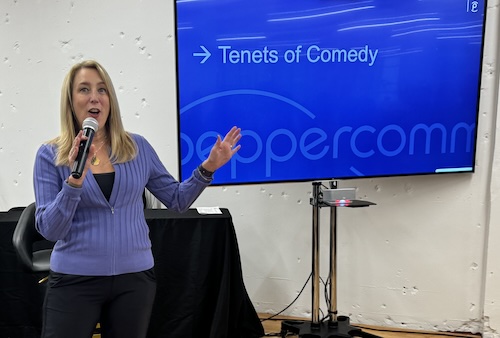 |
| Jacqueline Kolek |
Empathy is defined as the ability to understand and share the feelings of another. The concept of being felt and heard by others is undoubtedly gaining in popularity across the business landscape. In fact, empathy is having a moment.
Experts and thought leaders from business, academia and wellness all agree that empathy is the new key to driving growth, unlocking creativity and engaging employees at work. EY’s most recent Empathy in Business Survey found that a majority (86 percent) of employees believe empathetic leadership boosts morale, while 87 percent of employees say empathy is essential to fostering an inclusive environment.
This isn’t surprising, given the challenges employees have faced over the last few years: from the COVID-19 pandemic and all the physical and mental challenges it created, to civil unrest, mass layoffs, continued economic uncertainty and more recent conflicts and atrocities around the globe. In fact, 52 percent of employees are experiencing stress every day and 18 percent are angry on a daily basis according to Gallup’s State of the Global Workplace: 2023 Report. That report further found that 52 percent of North American employees are quiet quitting and 17 percent are loud quitting and actively disengaged.
It’s clear that engaged employees aren’t just a nice to have, but critical to enabling organizations of all sizes to weather business headwinds. According to human capital management firm Ceridian, low employee engagement is costing $664 billion in lost productivity for employers across North America each year. So, just how do leaders create a culture of empathy and foster truly empathetic leadership that empowers, engages and motivates employees? The answer may seem like a joke, but the business benefits are no laughing matter.
Humor, when applied appropriately in the workforce, has the unique power to build bonds, foster collaboration, enhance teamwork and creativity and increase productivity. In fact, a Hewitt & Associates study found that organizations where humor is part of the culture showed increased shareholder returns of 19 percent.
 |
| Leading a presentation on humor for an agency-wide summit. |
Humor in the workplace isn’t about telling jokes, pulling pranks or roasting employees. Rather, it’s the art and science of applying the skills that every comedian has to your individual leadership style. For example, comedians are highly practiced at reading a room to understand if their material is hitting the mark or bombing and—based on whether or not they’re met with laughter or silence—learning from that feedback to tweak and adjust moving forward. They’re also expert storytellers.
Think about some of your favorite comedians, from Wanda Sykes to Jerry Seinfeld or Sebastian Maniscalco, their material is based on telling stories about things they observe or experience, served up with an unexpected ending. In comedic structure, a punchline is really just taking a story or topic that the audience is familiar with and putting an unexpected twist on it. This surprise element both delights audiences and enables them to retain information better.
Finally, comedians often rely on self-deprecating humor, telling stories about a challenge they have overcome or the time they were underdog in a particular situation. When leaders practice self-deprecating humor, it humanizes them and helps foster connect and trust with their direct reports. As a senior leader in my organization, I often poke fun at myself by talking about my poorly trained dogs, my love of my InstaPot or my obsession with shows on the Bravo network. As a result, I have an instant connection with my teams. They’ll often ping me about the latest episode of the “Real Housewives” or tease me about throwing pressure cooker ideas into every brainstorm. By creating these platforms to connect with my teams beyond account work, they get to know me on a different level and that leads to enhanced empathy and understanding of each other.
Another form of humor that helps to foster empathy in the workplace is the use of improvisational comedy. Improv is an art form where improvisers perform without a script and one which operates with three essential rules:
- The first thought is the best thought.
- Reserve judgment.
- Create a culture of support.
Many of us in the workplace are plagued by a “yes, but” culture. You’ve all heard “sure, that’s a great idea, but the CEO will never go for it.” Yes, but shuts down ideas, demotivates teams, inhibits creative thinking and discourages connection and collaboration. Essentially, it makes people feel like they’re not heard and is the antithesis of empathy.
At Peppercomm, we’ve worked long and hard to instill a culture that embraces the concept of “yes, and.” That means accepting an idea and building on it. Improv, when done successfully, relies on active listening, collaboration and ensuring the whole team or ensemble looks good. In partnership with our Laughing Matters Council members, Peppercomm conducts improv-based training programs for clients that leverage a variety in interactive exercises that help to shift thinking from “no, that will never work” to one of accepting and building, storytelling from different perspectives and audience-centric storytelling. Throughout these trainings, exit survey data shows that team members feel more comfortable sharing ideas, have enhanced trust across their teams and feel heard. The concept of accepting the first idea and going with it truly builds an empathetic culture where everyone feels their ideas, thoughts and feelings are heard and valued.
Recent research from Catalyst found that 76 percent of workers with highly empathic senior leaders report often or always feeling engaged, compared to only 32 percent of those with less empathic senior leaders. Furthermore, 61 percent of those with highly empathic senior leaders report often or always being innovative at work compared to only 13 percent of those with less empathic senior leaders. Humor in the workplace can be a superpower to building and fostering an empathetic culture that will engage and motive employees in both the best and worst of times.
***
Jacqueline Kolek is Peppercomm’s Chief Innovation Officer and EVP.


 Fiona Hutton, founder and CEO at Fiona Hutton & Associates, shares her insights as a female entrepreneur on how to overcome analysis by paralysis and how "Type A” executives can be effective leaders on the most recent Taking The Lead video podcast.
Fiona Hutton, founder and CEO at Fiona Hutton & Associates, shares her insights as a female entrepreneur on how to overcome analysis by paralysis and how "Type A” executives can be effective leaders on the most recent Taking The Lead video podcast. While employee inclusion is important for any workplace, three recent examples illustrate how staff empowerment can potentially threaten an organization.
While employee inclusion is important for any workplace, three recent examples illustrate how staff empowerment can potentially threaten an organization. David Barkoe, founder and CEO of Carve Communications, says it’s possible to effectively lead teams, even virtual ones, through any challenge.
David Barkoe, founder and CEO of Carve Communications, says it’s possible to effectively lead teams, even virtual ones, through any challenge. As faith in institutions crumbles and the spread of AI-generated fake news fuels people's mistrust about information, it's time for the PR business to focus on serving the public interest.
As faith in institutions crumbles and the spread of AI-generated fake news fuels people's mistrust about information, it's time for the PR business to focus on serving the public interest.


 Have a comment? Send it to
Have a comment? Send it to 
No comments have been submitted for this story yet.